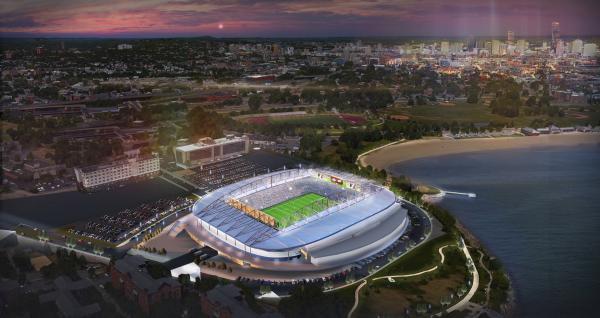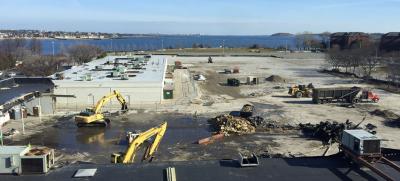April 27, 2017

The Kraft family released this image of a potential New England Revolution stadium rendering on April 28.
UMass says stadium "does not appear feasible."
Updated April 28, 3:31 p.m. -- Discussions between UMass Boston and Robert Kraft's sports empire to build a professional soccer stadium on the UMass-owned Bayside site in Dorchester have officially ceased.
Rep. Nick Collins, who represents South Boston and parts of Dorchester, including Columbia Point, told the Reporter on Thursday evening that high-level sources within the UMass administration have told him the plan to build a 20,000-seat facility on the site will not proceed. Instead, the university intends to revisit earlier plans for developing the waterfront site in concert with elected officials from the neighborhood.
UMass spokesman Jeff Cournoyer later confirmed, "we have determined that a potential stadium at the Bayside site does not appear feasible at this point."
Public debate swirled for almost a year around plans for the 20-acre Bayside property, acquired by UMass in 2010. The university, now finished demolishing the one-time Point staple, had used the nearby lot for parking and was considering other revenue-generating options for the land as it wrestled with an ongoing deficit problem.
“Now that this negotiation is over, I want to turn our focus toward maximizing the benefits of this unique waterfront property in our neighborhood,” Collins said. It is vital, he said, that “Dorchester residents are brought to the table to determine what is the best use of the property in best interests of UMass, its students, and its faculty.”
It was revealed in June 2016 that UMass Boston officials had conversations with Patriots and New England Revolution owner Robert Kraft about the possibility of building a soccer stadium the waterfront land owned by the Boston school on the grounds of the old Bayside Expo Center.
As the Bayside site continued to be demolished early in 2017, UMass officials confirmed that they were considering a 20,000-seat, $250 million home for Kraft’s Major League Soccer franchise.
Robert and Jonathan Kraft released a statement and renderings of the possible stadium on the New England Revolution website Friday afternoon.
“In 2015, we were invited to put together a stadium proposal for the former Bayside Exhibition Center site," they wrote. "Since then, we have invested millions of dollars and thousands of staff hours to design and structure a venue that would benefit UMass Boston, the City of Boston and serve as an asset to the surrounding communities, with an operating plan that would benefit all local constituencies. We were committed to a fully-funded, privately-financed stadium that would have totaled an investment in excess of $250 million. There was also a full-value land lease to UMass that would have provided annual payments to the university. As is the case with any development opportunity, there were numerous hurdles to overcome and we regularly adjusted our plans to cater to the needs of the project."
"Unfortunately," the continued, "and for reasons beyond our control, it has been determined that this project is not feasible to pursue on this site at this time. It is our goal to continue to seek development opportunities where we can invest in a soccer specific stadium that will benefit its surrounding communities while giving our fans and our players a venue they will be proud to call home for generations to come.”
Members of the community and elected officials responded with ire at the initial announcement, decrying the closed-door meetings and asking for transparency as the public university made determinations of the best use for its land.
 Bayside Expo site nearly cleared on Columbia Point
Bayside Expo site nearly cleared on Columbia Point
Infrastructure and neighborhood pressures weighed on community discussions regarding the stadium.
They pointed to existing problems with the oft-jammed Kosciuszko Circle, near the JFK/UMass MBTA station, the entrance to Interstate 93, and the frequently-flooded William T. Morrissey Boulevard, which is on the early end of an extended redesign.
Mayor Martin Walsh and Governor Charlie Baker offered measured support for the possible stadium, with the former noting the potential for any development deal to include commitments to deal with infrastructure issues in the area.
When asked about the issue on WGBH radio on Friday, Walsh said the mayor's office had been involved in “conversations” about bringing the stadium to Dorchester, but did not pressure the university to deal with Kraft.
Walsh said that stadium deal could have been “a solution” for “the financial situation at UMass Boston” and would have brought “major investment” to the community.
He concluded: “I don’t think it’s the right time for that location right now.”
The stadium proposal was also not in line with prior discussion of the site, opponents noted. Several rounds of public input, including a three-year process that culminated in the creation of the 2011 Columbia Point Master Plan and UMass-led charrettes did not align with such a proposal, they said.
“Local elected officials have been unified in their wanting to get the process right and making sure residents were at the table and had a say,” Collins said.
Partially in response to the secrecy of the stadium negotiations, state Sen. Linda Dorcena Forry and state representatives Dan Hunt and Nick Collins filed bills in January that would limit the primary purpose of University of Massachusetts Boston buildings to education and necessitate an open public process for any new development undertaken by the UMass Building Authority.
Any new steps for the site will include public input, Collins said.
“It's the gateway to Dorchester from the city, and an important one to get right,” he said.
Jennifer Smith can be reached at jennifer.smith@dotnews.com, or follow her on Twitter at @JennDotSmith
Topics:


